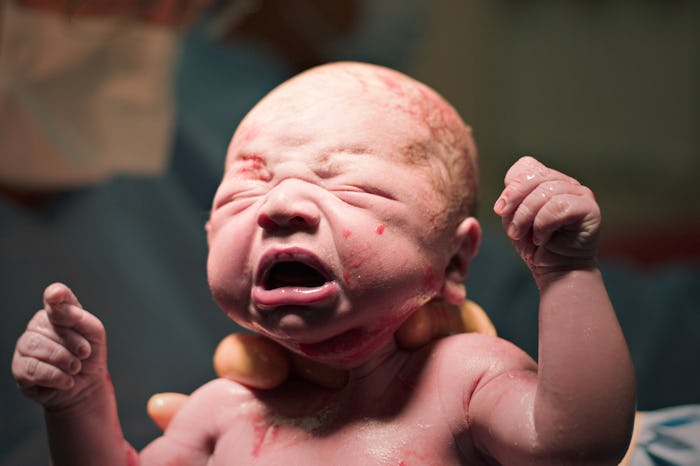Life

Before You Add Vaginal Seeding To Your Birth Plan, There Are Some Risks To Weigh
Right now, you can't spit without hitting several articles about how to have the most natural birth experience. People are eating placentas, they're giving birth in bathtubs, and hiring doulas to make their birth as close to their vision as possible. However, this doesn't always go as planned. When women have to undergo a C-section, many are concerned that their baby is missing out on something essential in the birthing process, and they turn to a practice gaining steam in the natural birth community called "vaginal seeding." But, you need to know the vaginal seeding risks and benefits before you decide to take such a drastic step after your C-section.
Vaginal seeding, as per the American College of Obstetrics and Gynecology (ACOG), "refers to the practice of inoculating a cotton gauze or a cotton swab with vaginal fluids to transfer the vaginal flora to the mouth, nose, or skin of a newborn infant." The idea is that the vagina contributes crucial elements of a newborn's microbiome that possibly aids in the prevention of "asthma, atopic disease, and immune disorders." These are diseases that occur more frequently in babies born via C-section than babies which are born vaginally, noted ACOG. Currently, ACOG warns against this policy, citing potential risk of infection, and they caution that it should only be done during the strict protocols of a study.
ACOG did not mince words. Vaginal seeding should not be performed outside the context of an institutional review board-approved research protocol until adequate data regarding the safety and benefit of the process become available." This opinion is echoed throughout the scientific and medical community.
Even the doctors piloting the study are concerned. Dr. Suchitra Hourigan, a pediatric gastroenterologist and director of the Inova Translational Medicine Institute in Falls Church, Virginia is one of these doctors, and she told The New York Times, “Women shouldn’t do vaginal seeding until trials show it’s safe and offers health benefits to infants. I’m worried about mothers doing this without screening and sometimes without supervision by a physician who says it’s OK.”
Yes, there are potential benefits to the practice, noted Professor Peter Brocklehurst from the University of Birmingham. He told BBC, "The first time a baby's own immune system has to respond are to those first few bacteria, that we believe is important for, in some way, setting the baby's immune system." It's just that right now, there isn't enough hard research on the benefits of the practice of vaginal seeding to outweigh its risks.
It might not even be necessary. Dr. Hourigan told The New York Times that breastfeeding is the safest way to assure that your baby gets all the benefits of your microbiota without the risks of herpes, chlamydia, or other infections that may be present and risk a life-threatening infection for your baby. "Breast milk contains many of the same beneficial bacteria found in a woman’s vagina," she said.
In fact, Dr. Trevor Lawley, a researcher in the Baby Biome project told the BBC that there are potentially beneficial bacteria that feed mostly on the breast milk of mothers. As per the interview, he mentions bifidobacterium, one of the chief bacteria discussed in vaginal seeding. "It is one of the first bugs to colonise humans early in life, and we believe they feed off sugars in the breast milk," he said.
In the end, this is something that should be discussed at length with your doctor or midwife before you decide to try it out for yourself. It's potentially very risky, and the rewards are not yet well documented. While it's tempting to go this route, the knowledge of vaginal seeding risks and benefits are too limited to do it without serious guidance.
Check out Romper's new video series, Bearing The Motherload, where disagreeing parents from different sides of an issue sit down with a mediator and talk about how to support (and not judge) each other’s parenting perspectives. New episodes air Mondays on Facebook.